
USA & CANADA (901)
Latest News
AstraZeneca COVID-19 vaccine FAQ: Why do the age recommendations keep changing? Does it cause VIPIT blood clots? Is it effective against variants?
Tuesday, 20 April 2021 12:41 Written by theconversation
Alexander Wong, University of Saskatchewan
Many people have questions about the changing guidelines for the use of AstraZeneca’s COVID-19 vaccine. Here are some answers from infectious disease specialist Dr. Alexander Wong.
How is the AstraZeneca vaccine different from the other COVID-19 vaccines?
ChADOx1 nCoV-19/AZD1222 (AstraZeneca’s COVID-19 vaccine, also called the Oxford-AstraZeneca vaccine and COVISHIELD) uses a modified adenovirus “vector” to deliver the genetic code for the SARS-CoV-2 spike protein to the cell nucleus. This vector has been modified so that it can enter human cells, but once inside, it cannot replicate. That means it can’t cause danger to the vaccine recipient.
Once inside the cell, the DNA for the spike protein is delivered to the cell nucleus. There, the code is translated into messenger RNA (mRNA) that the cell can then use to manufacture its own spike proteins.
These spike proteins then help to stimulate the body’s immune system to develop antibodies. It is these antibodies that help protect us from infection and severe illness when we are exposed to the SARS-CoV-2 virus.
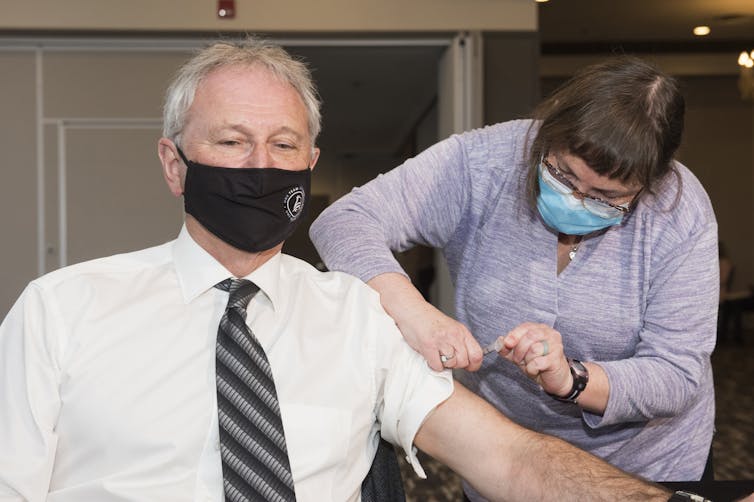
AstraZeneca vaccine is different than the mRNA vaccines (such as Pfizer-BioNTech and Moderna). The adenovirus “vector” and the DNA code that the vector transports are much more resilient and hardy compared to the lipid particles that hold the fragile mRNA code to be delivered into cells with the Pfizer-BioNTech and Moderna vaccines.
This leads to several practical advantages with AstraZeneca vaccine compared to mRNA vaccines — it does not have to stay frozen while stored and it can last for months at regular fridge temperatures. It is also less expensive to produce in large quantities.
The AstraZeneca vaccine was 70 per cent effective against symptomatic COVID-19 infection in a large multinational study. Another large study done primarily in the United States recently reported 76 per cent overall efficacy against symptomatic COVID-19.
Read more: COVID-19 vaccines: How Pfizer's and Moderna's 95% effective mRNA shots work
While these efficacy data are slightly less than the reported efficacy from mRNA vaccines, AstraZeneca vaccine is completely effective at preventing severe illness and hospitalizations, like mRNA vaccines.
The overall efficacy differences between AstraZeneca vaccine and mRNA vaccines are minor. For most persons in Canada, the best vaccine is typically the one that you’re offered first, especially amid the current third wave sweeping across the country.
Why has its use been suspended in some areas? Is it linked to blood clots?
In early March, reports from various countries in the European Union linked use of AstraZeneca vaccine to the potential for rare but potentially fatal blood clots, termed “vaccine induced prothrombotic immune thrombocytopenia,” or VIPIT. Data from Germany suggest an incidence rate of roughly one per 90,000 shots. A recent update from the European Medicines Agency suggests an incidence rate of one per 100,000 shots across Europe thus far.
Researchers speculate that the vaccine may cause platelets to begin clotting, similar to a rare phenomenon caused by heparin, a blood thinner. Data is still emerging around the potential association between AstraZeneca vaccine and VIPIT, and the degree of risk remains unclear.
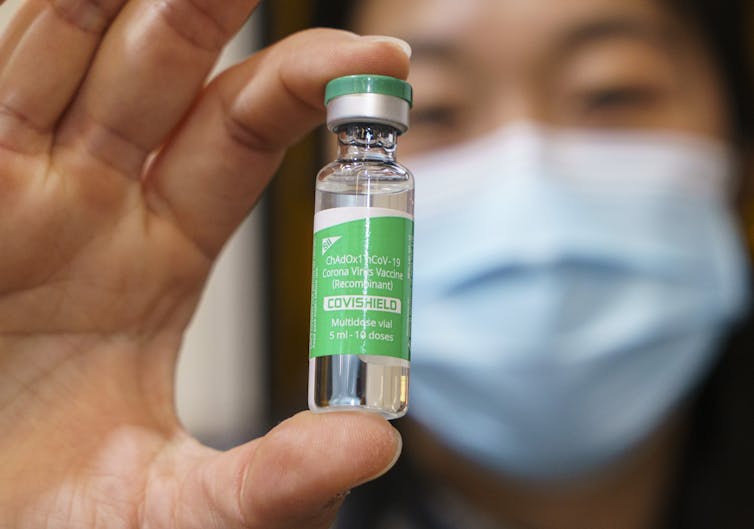
On March 31, Canada suspended the use of AstraZeneca vaccine to all those under the age of 55. Germany did the same, but in all those under the age of 60. The United Kingdom suspended use in all those under the age of 30.
The reasoning in Canada (and other countries) for the age-related pause on the use of AstraZeneca has to do with a calculation of risk versus benefit for a given individual. The overall risk of death in persons under the age of 55 who acquire COVID-19 infection is very low in Canada.
When comparing the risk of death from COVID-19 in younger persons versus the risk of VIPIT from AstraZeneca vaccine, regulators made the decision to be cautious with their guidance, especially because Canadians have access to other vaccines such as Moderna and BioNTech-Pfizer and soon Johnson & Johnson vaccine as well.
As the evidence evolves, guidance for the use of AstraZeneca vaccine will likely change again.
Why are there different recommendations for different age groups — and why do they keep changing?
As described in the previous answer, there is an inherent balance between risk and benefit that expert groups needed to navigate when issuing guidance around AstraZeneca vaccine in the absence of definitive data. As we get older, our risk of dying of COVID-19 infection also increases. Thus, the balance between risk and benefit tips towards administration of the vaccine, which significantly reduces the likelihood of severe illness, hospitalization and death.
In younger people, this balance is more complicated, especially now with widespread circulation of variants of concern across Canada. These variants are known to be more transmissible and more deadly.
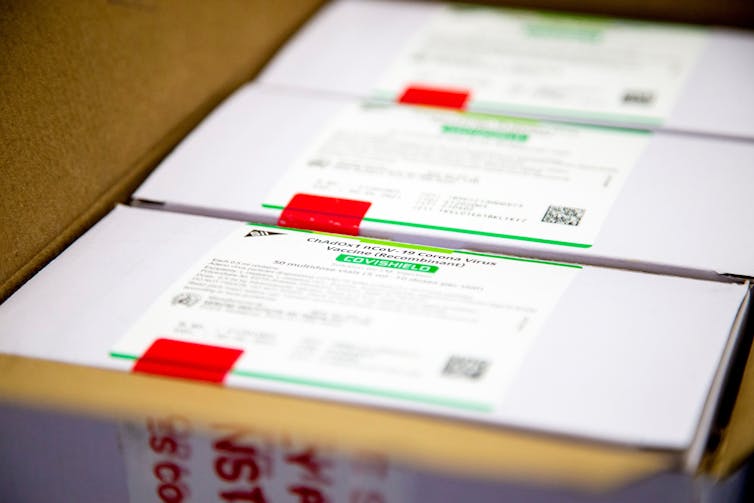
Early in March, initial recommendations from the National Advisory Committee on Immunization (NACI) in Canada suggested that AstraZeneca vaccine not be used in persons over the age of 65.
This was because the initially reported clinical trial data from December included a very limited number of people over the age of 65, so the efficacy of the vaccine could not be determined in this age group.
Shortly thereafter, supportive real-world evidence generated from the United Kingdom was reviewed by NACI and deemed to be sufficient to illustrate the efficacy of AstraZeneca vaccine in persons over the age of 65, and recommendations changed accordingly.
The changing recommendations by NACI and other guideline groups are a reflection of changing evidence and science, not the inadequacy of the vaccine itself. This is precisely how post-marketing surveillance is supposed to work with medicines and vaccines.
However, with such incredible scrutiny of this topic as a result of the global pandemic, trying to explain these concepts to the lay public has been challenging for regulators, public officials and health-care professionals alike.
What should I do if I’ve already had one dose of the vaccine, but it’s no longer recommended for my age group?
At present, this is unclear. Various studies are underway looking at combining different COVID-19 vaccines, particularly in the U.K., but there isn’t a good evidence base for this yet.
Public health guidance will be updated as evidence emerges, but if the association between AstraZeneca vaccine and VIPIT continues to hold firm, my best guess is that people in this situation will be offered a second dose of vaccine, but from a different manufacturer. Right now the current guidance remains to try not to administer different vaccines at different time points, if possible.
Is it effective against the new variants?
Data for the efficacy of AstraZeneca vaccine against the predominant circulating variants remains limited. Published data from clinical trials suggests that the vaccine remains effective against the B.1.1.7 variant found predominantly in the U.K., even though the vaccine induced lower blood levels of antibodies against the B.1.1.7 variant compared to the non-mutated virus.
Preliminary published data from South Africa at a time when the B.1.351 variant was circulating widely suggested AstraZeneca vaccine had no reduction in the rate of mild to moderate COVID-19 infection in mostly young and healthy persons. However the trial included only small numbers overall.
The ability of the AstraZeneca vaccine to limit severe disease and hospitalization against the South African variant could also not be determined in this study due to very low numbers of young people otherwise becoming severely ill. More data is needed to better answer this question.
Alexander Wong, Associate Professor, Infectious Diseases, University of Saskatchewan
This article is republished from The Conversation under a Creative Commons license. Read the original article.
Rural vs. urban Canada: No ‘one size fits all’ COVID-19 recovery
Tuesday, 20 April 2021 04:40 Written by theconversation 
Sarah-Patricia Breen, University of Saskatchewan
The realities of rural Canada are poorly understood, with the word rural often used as though it’s a monolithic thing.
In February, a news article published across Canada identified a rural-urban split in the distribution of the Canada Emergency Response Benefit, known as CERB. The article identified a higher proportion of urban residents relying on CERB. The article provided perspectives from various people offering explanations about the possible reasons for the difference.
These explanations featured generalizations about urban reliance on tourism resulting in greater need, and rural reliance on natural resources that “wouldn’t have been hit as hard” by COVID-19.
This narrative no doubt came as a surprise to tourism-dependent rural communities, where COVID-19 has had significant impacts on employment and exacerbated tensions between residents and urban visitors.
Read more: Do you have a right to go to the cottage during the coronavirus pandemic?
The tourism sector, in fact, is critically important to rural communities. In British Columbia, for example, rural communities are on average more dependent than urban centres on tourism as a source of employment, and communities with the largest dependence on tourism are rural.
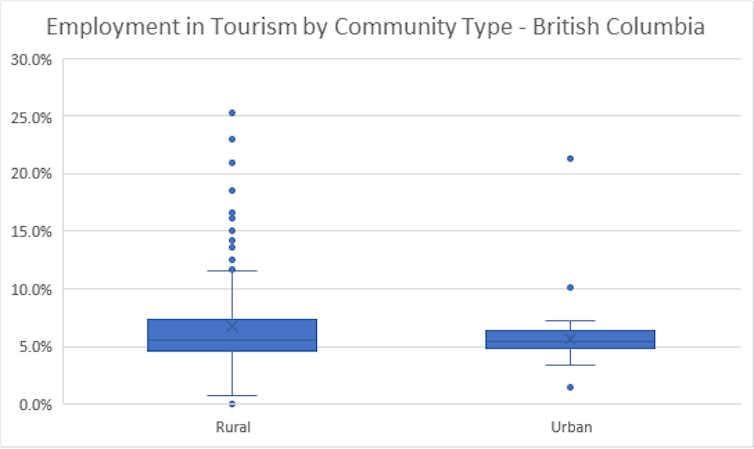
The notion that communities reliant on natural resource sectors were not as hard hit by COVID-19 also likely came as a surprise. These communities continue to experience layoffs and costly changes to business practices.
Statistics Canada data shows that employment in forestry, fishing, mining, oil and gas is below previous years’ levels.
The use of social programs is complex
Just as there are unique dynamics influencing different sectors, the use of support programs by rural Canadians — whether they’re federal or provincial support programs, aimed at businesses or those who have lost work — is also complex. Use is not only influenced by need, but by other factors, like the ability to access support.
Treating rural communities as a monolithic entity conceals the range of experiences across rural communities. The resulting narrative can create false impressions — including the notion that rural communities are doing well in comparison to urban areas during the COVID-19 pandemic.
If we consider economic concentration in British Columbia by community size, we see that rural communities on average are less economically diverse. However, we also see high levels of variation among rural communities — some are as diversified as urban centres.

Data from other provinces and territories will tell a different story — because there is far more than a single rural story.
Rural data matters
All of this illustrates a larger pattern of failing to recognize rural diversity. This pattern contributes to policy failures that impact rural realities and limit future opportunities. The sheer number of communities in rural Canada, along with a lack of organized and accessible community-level data, often leads governments to develop policies that do not account for the differences between rural and urban, let alone differences across rural regions.
Governments tend to understand urban and rural as two contrasting groups, and that rural communities need help catching up with urban centres. This is wrong on two levels.

First, it does not consider variations within each group. Second, it assumes that development for rural communities means becoming more urbanized. As a result, one-size-fits-all policies are created that don’t account for the realities of rural communities.
Policies are time and again built on this binary understanding, mostly because this simplification makes policies easier to create and implement.
A first step to developing better policies is to improve policy-makers’ knowledge of rural communities by compiling and organizing community-level data in a user-friendly way. Although it can be difficult to obtain data, especially for small and Indigenous communities, much of what is available is under-used. Improving access would help to close this gap.
However, data access is not enough to bring about better policies. Decision-makers need to be convinced of the need to recognize rural diversity.
How composite indicators can help
That is where composite indicators (CI) can play a role. CIs — like the United Nations’ Human Development Index — can synthesize multidimensional concepts into a single score through the compilation of individual indicators.
The ability to simplify complex issues makes CIs powerful tools to draw attention to a topic. A well-designed CI can shed light on a range of different rural realities and spur a conversation about the need to acknowledge rural diversity in policy.
One approach to building a rural CI is to base it on five types of capital. How communities perform in each of these areas can help policy-makers understand their needs and barriers.
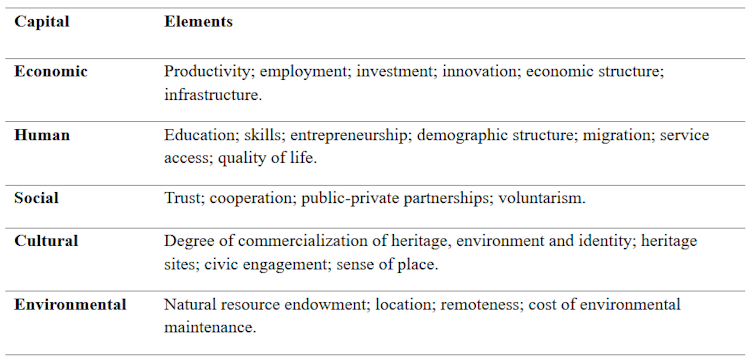
CIs are one tool to shine a spotlight on rural diversity and provide insights into rural realities. However, moving away from policies that treat rural communities as an undifferentiated group will require more than a single tool.
It requires acknowledgement that viewing rural Canada as monolothic and the policies — and news stories — built on that assessment have limited value for rural communities. As Canada prepares for post-pandemic life, rural communities would benefit from flexible policies that support them in achieving their goals.
Diogo Oliveira, who graduated with a master’s in public administration from the University of Victoria, co-authored this piece.
Sarah-Patricia Breen, Adjunct Professor, Public Policy, University of Saskatchewan
This article is republished from The Conversation under a Creative Commons license. Read the original article.
Sexual misconduct, abuse of power, adultery and secrecy: What I witnessed in Canada’s military
Monday, 19 April 2021 05:48 Written by theconversation 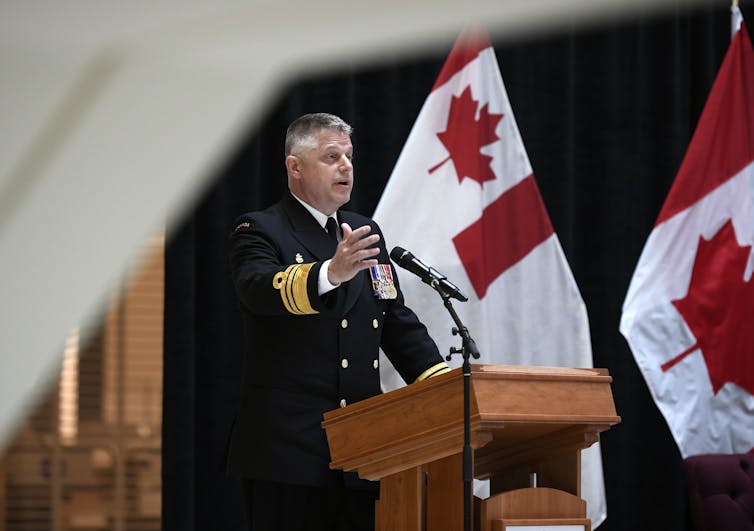
Karyne Gélinas, Saint Mary’s University
As a female veteran observing reports of sexual misconduct among senior Canadian Armed Forces officers, I have been forced to make sense of my own experience.
Over the years, I witnessed firsthand the culture of secrecy and adultery that isn’t spoken of outside military circles. Everyone knows it happens, yet everyone remains quiet. The “no fraternization” policy is treated as a suggestion and rarely enforced. It is widely understood that “what happens in deployment, exercise or training, stays there.”
Something is wrong with Canada’s military. From the recent testimony given in parliamentary committee on the handling of the Gen. Jonathan Vance investigation, to a senior military commander being under investigation after being accused of sexually assaulting a subordinate, and the Liberal government’s recent shutdown of the probe into sexual misconduct. My doctoral research since leaving the military has led me to conclude that the military unconsciously fosters a culture of sexual misconduct, abuse of power, adultery and secrecy.
Consequences and failed regulations
Both women and men participate in these behaviours. It feels as though it’s widely accepted, so much so it borders on being encouraged. The accepted sexual behaviours in the Forces can have severe consequences beyond harassment. And like everyone else, I went along with it. I entered a “pact of secrecy” and became part of the problem by being a bystander.
In 2015, following a Supreme Court Justice report on sexual misconduct in the military, Operation HONOUR was established to “eliminate harmful and inappropriate sexual behaviours,” within the Forces, including LGBTQ2+ discrimination.
Six years later, Operation HONOUR has ended despite multiple high-ranking officers facing accusations of sexual misconduct.
There is an undeniable need for a culture change. However, the problem will not be fixed through the force-feeding approach of continuously creating regulations and policies to establish the desired culture — that has proven to be ineffective.
A different approach
The literature is scarce when examining the military outside of mechanistic and cultural perspectives.
A theoretical approach to understanding the military is to adopt organizational theorist Gareth Morgan’s psychic prison metaphor. This idea implies an unconscious power structure acts as a control measure.
Morgan says, “powerful visions of the future can lead to blind spots,” and strong groupthink can lead to organizational pathology, which addresses internal aspects of an organization that has become dysfunctional, counterproductive, inefficient, disruptive or destabilizing.
Morgan’s psychic prison metaphor tells us that cultural structures, rules, behaviours and beliefs define the organization and are “personal in the most profound sense.” By using the psychic prison metaphor to understand military organization, we might be able to better understand the military culture and its taken-for-granted assumptions, and determine a better way to address the needed change. It “encourages us to recognize that rationality is often irrationality in disguise” and “plays a powerful role in drawing attention to the ethical dimension of organization.”
When I was a new junior officer, I filed my first complaint of misconduct, which led to five other individuals coming forward. As punishment, the person the complaints were against was asked to write an apology letter. Years later, he bragged about the paper trail being removed before his posting. I took this information up my chain of command and was told that it was in the past.
Despite this misconduct reoccurring with other members, nothing was ever done.
That instance made me lose faith in the system. I never filed another complaint of misconduct again, and kept telling myself it was either “not bad enough,” that “I could handle it,” or I would deem it “OK, it was the alcohol.” I had become a prisoner of the psychic prison.
In an interview with Global News, Navy Lt. Heather Macdonald (who
) says she is bothered that someone in a “trusted position” has such “weak ethics and values” to leak her allegations to the press. She believes “that what process we have needs to remain fair, and everybody including me should have due process.”In saying that, Lt. Macdonald is unconsciously protecting the institution as I did. She believes that the leak will affect the due process but it’s the same process that has failed time and time again.
The psychic prison, while not visible, manifests itself through our actions. Our silence perpetuates the issue. In the Forces, we are taught to protect the mission and the institution, before self. The psychic prison unconsciously traps us all: victims are afraid to speak out, aggressors face little retribution and bystanders simply turn a blind eye.
Towards a culture change
The bulk of Canadian Armed Forces’ research focuses on the measurable and the visible, but only scratches the surface of what the military culture truly is. I believe there are deeper levels of understanding to be reached, and the psychic prison offers a new approach for understanding the embedded inequalities and misconducts.
Undoubtedly, the first step is to identify and acknowledge the presence of such a strong power structure. But a permanent change will only be possible once we understand the unconscious level and the invisible forces imposed on members.
Acting Chief of Defence Staff Lt.-Gen. Wayne Eyre is on the right track when he said “the gaps are becoming apparent, such as power dynamics and understanding the use and abuse of power in a hierarchy like our own.” But until he sees how everyone colludes consciously and unconsciously in perpetuating these dynamics, nothing will change.
Karyne Gélinas, PhD Student, Business Administration, Saint Mary’s University
This article is republished from The Conversation under a Creative Commons license. Read the original article.
Canadians should be able to access dental care with a health card instead of a credit card
Friday, 09 April 2021 00:49 Written by theconversation 
Hasan Sheikh, University of Toronto
The COVID-19 pandemic has raised Canadians’ anxiety levels: anxiety about contracting the virus, financial hardship and isolation. But one thing Canadians don’t have to worry about is how they’ll pay for essential health care if they need it. For that, at least, all we need is our health card.
Actually, that last part is only partially true. Vital areas of health care were excluded from medicare, our universal health-care system. And for many Canadians, access to these health services has worsened since the start of the pandemic. Many have lost their jobs, and with that, essential health benefits like dental care.
The COVID-19 pandemic has reinforced just how foundational medicare is. As we recover from the effects of the pandemic, we must strengthen that foundation. It’s time for Canadians to start using their health card, not their credit card, to access dental care.
Health and oral health
Dental care is not luxury. Oral health is a critical part of overall health. Dentists and emergency physicians see the consequences of poor oral health on a daily basis.
Poor oral health can cause or worsen other medical conditions due to chronic inflammation. Providing dental care improves diabetic control, reduces the risk of aspiration pneumonia in long-term care homes, improves completion of treatment for substance use disorder and increases drug abstinence.
It has even been shown to increase employability. It’s hard to confidently interview for a job if you’re afraid to smile.

One in three Canadians lack dental insurance and one in five avoid seeing a dentist each year due to cost. In terms of dental care, our “universal” health-care system is anything but. Of all dental care spending, only five per cent is public. That’s less than the United States, where 10 per cent of dental care spending is public, and not even close to the United Kingdom, where it is 46 per cent.
This already dire situation was worsening before the pandemic, with more seniors retiring and losing their work-related benefits and more people working in the precarious gig economy. COVID-19 has only exacerbated this.
If Canada’s health-care system were a mouth, it would be too embarrassed to smile for fear of showing the large gap that is our missing dental care system.
The cost of forgoing dental care
Many Canadians forgo routine care because they can’t afford it, leaving small problems to fester and grow. Our current system not only stresses our individual wallets, it also puts additional strain on our health-care system.
With four in 10 low-income Canadians avoiding seeing a dentist due to cost, many end up relying on our emergency departments. Every nine minutes in Ontario, someone visits an emergency department for dental pain, when they really need to see a dental professional. The cost of these visits across the country is estimated to be more than $150 million a year.
The Canada Health Act makes the objective of Canadian health-care policy very clear:
“to protect, promote and restore the physical and mental well-being of residents of Canada and to facilitate reasonable access to health services without financial or other barriers.”
Given this, we must guarantee access to essential dental care for every Canadian.
Expanding public spending to guarantee dental insurance for all would help Canadians access routine care, reducing the need for more costly and complex procedures later. This would benefit individuals, reduce costs for employers and give businesses a competitive advantage similar to the way medicare does now.
Challenges beyond public financing
While public financing is important, it doesn’t guarantee access to a provider. The private delivery model has left many poor and rural communities significantly under-resourced. Public delivery of some dental care can ensure that people actually have a provider near their community.

Many dentists in private practice have historically been hostile to universal dental care and public delivery. That’s no surprise because it cuts into their monopoly on care.
Doctors were once the same too. Doctors were the biggest opponents of medicare when it was first introduced in Saskatchewan. On July 1, 1962, the day medicare was born, most of the province’s doctors went on strike. But now, very few would want an American-style health-care system like we currently have for dental care — especially during the pandemic.
The COVID-19 pandemic hasn’t given Canadians many reasons to smile. Investing in a universal, publicly-funded dental care system would ensure that a healthy, pain-free smile is in sight for every Canadian.
This article was co-authored by Brandon Doucet, a dentist practising in Newfoundland with interests in surgery and public health and the founder of Coalition for Dentalcare.
Hasan Sheikh, Lecturer, Department of Family and Community Medicine, University of Toronto
This article is republished from The Conversation under a Creative Commons license. Read the original article.
Popular News
Ontario's ‘choice’ of fully online school would gamble on children for profit
Tuesday, 06 April 2021 03:16 Written by theconversation 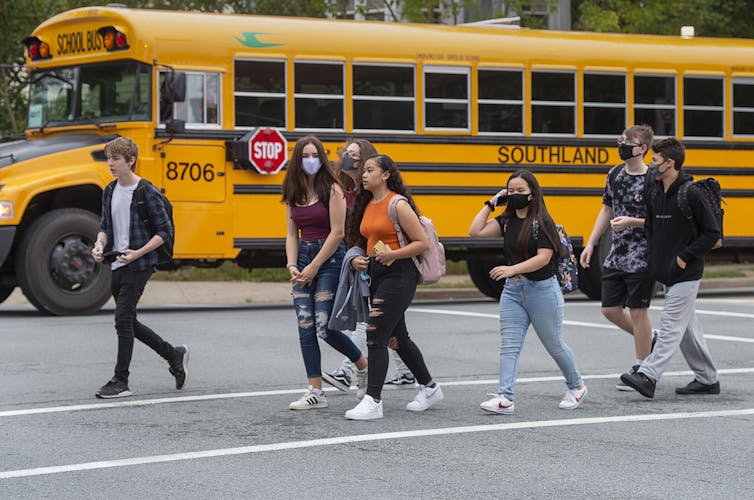
Lana Parker, University of Windsor
Despite the lack of data documenting benefits to children, and emerging evidence of several drawbacks and harms, the Ontario government is discussing making full-time online schooling a permanent “choice” in public education.
Read more: 'School choice' policies are associated with increased separation of students by social class
This idea is being introduced without adequate research, and stands to become the latest measure that raises inequality and threatens the viability of education as a public good.
The Globe and Mail obtained an Ontario Ministry of Education presentation dated March 22, 2021, detailing the prospect of continued virtual learning after the COVID-19 pandemic. The province aims to partner with TVO to offer “fully independent online learning” for “Ontario and out-of-province secondary students” and also mentions continuing “synchronous remote learning” for elementary students.
The proposal coincides with apparent plans to continue to help fund Ontario education by selling curriculum abroad. In 2015, Ontario reported it had agreements with 19 international private schools that pay the province to deliver the Ontario curriculum.
Unpacking the known harms
While the COVID-19 environment has produced unique challenges, many of the greatest difficulties for young people have been associated with the forced shift out of schools and into online learning. Online learning does not replace the complex, relationship-oriented learning and social environment in schools.
Fully online learning has had consequences for mental health, with increased feelings of social isolation. There have also been challenges to physical health, as youth grappled with a lack of physical activity and deteriorating eyesight. Even among older youth learners, motivation and engagement prove difficult to sustain online, with a higher potential for dropping out and worse outcomes for disadvantaged students.
Despite the negative outcomes associated with full-time online study for youth and without sufficient data to support its rationale, the Ontario government is introducing an unasked for “choice” that would set a detrimental precedent for public education.
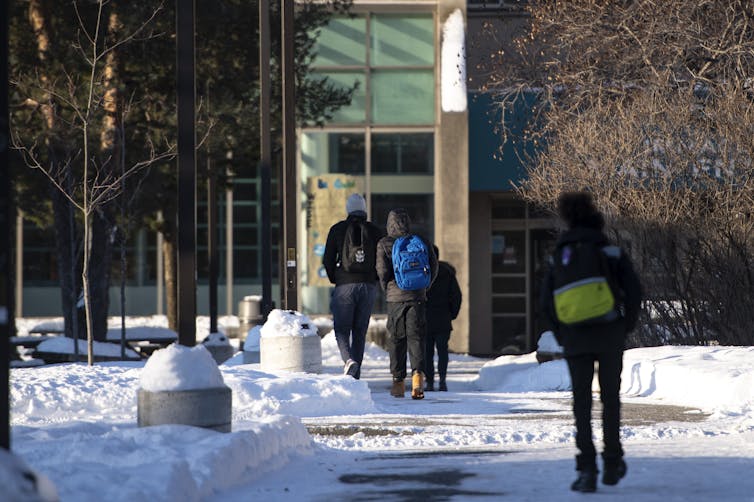
More screen time?
Some might argue that getting students comfortable with online technologies prepares them for future study and the workforce. In my research on youth literacy and online engagement, however, I explore how student proficiency in navigating technology should not be mistaken for understanding complex information.
My work is part of a wider body of emerging research that examines how students make sense of the online environment — and how being online affects their literacy skills, including their capacities to form critical questions and navigate misinformation and disinformation.
I have also determined that literacy learning can be strengthened when students and teachers explore the emotional implications of contentious issues in a classroom community. In other words, leaving students alone in front of screens for even more of their already online-immersed day does not improve their critical thinking or engagement.
For adolescents, learning online doesn’t replace in-person interactions with teachers, other students and community members. These interactions, far from superficial or inconsequential, are at the heart of how students learn well. In the pandemic, many teachers have voiced concerns about how an online environment hampers their ability to tailor learning and to support their students with the full range of strategies that are available in the classroom.

Yet another worrying aspect is the risk to student privacy. There is ongoing concern about how tech companies may be gaining unprecedented insight into children’s lives and how data may be used.
Read more: Children's privacy is at risk with rapid shifts to online schooling under coronavirus
There are also issues of tech monopolies that muddy the line between public education and private enterprise.
Generating revenue
Students have opportunities to engage with online learning in Ontario’s current framework. There is no need to introduce compulsory online courses or the option of full-time online learning.
With all the issues implied by full-time online learning, why would Ontario consider making this a permanent feature of public education? Before the pandemic, in February 2020, the government was striving to introduce mandatory online learning in secondary school.
In a confidential Ontario government document written sometime between March and August 2019 and obtained by the Toronto Star, the current Ford government detailed a plan to dovetail cuts to school board funding with the opportunity to “to develop (a) business model to make available and market Ontario’s online learning system to out-of-province and international students.” It is telling that the document did not foreground the benefits of full-time online learning for students.
The reasons for this shift can be attributed to the ongoing drive to privatize public education through the twin aims of reducing costs and generating new revenue. The 2019 document also mentioned examining “feasible options for selling licensing rights to courses/content to other jurisdictions.”
Curriculum sales
The current discussions should be seen in the context of Ontario’s drive to create revenue streams through international student tuition and sales of curriculum to international schools.
Ontario’s March 22 proposal for online schooling describes a plan to develop curriculum and offer an education “with little teacher support.”
This “business plan” follows Minister of Education Stephen Lecce announcing the appointment of a former CFL commisioner to the role of TVO’s CEO. TVO’s website has been recently retooled to include an emphasis on “digital learning.”
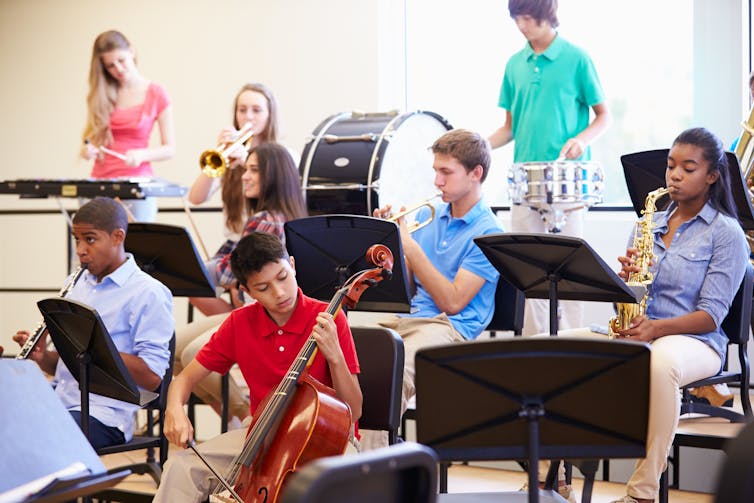
Potential future harms
For children, fully online learning creates the conditions for further educational inequality. It is a particular risk for children with special education needs.
It can also produce unintended consequences: a recent study based in Ecuador showed female students working online were more likely to spend time doing housework than their male counterparts. It is not unimaginable that some families could select online schooling for their children so they could help with household work, care for family members and potentially supplement family income by entering the labour market earlier. The move also risks limiting opportunities for extra-curricular socialization and learning, including experiences with the arts and sports.
Once poorly researched educational policy comes into practice, it is difficult to undo irrespective of data that details its harms. Such has been the case with the introduction of standardized testing in Ontario, which marginalizes newcomers and students with exceptionalities, and encourages a narrow curriculum.
Over time, a policy of “choice” for full-time online schooling weakens public education by diluting in-person opportunities for students and eroding funding. An impoverished public system drives families into private schools, which further erodes the public good. Defunding and marketization will leave public education in a race to the bottom.
Lana Parker, Assistant Professor, Faculty of Education, University of Windsor
This article is republished from The Conversation under a Creative Commons license. Read the original article.
Nigeria is being looted with impunity under Buhari – US
Friday, 02 April 2021 12:56 Written by correctngThe United States has said that “widespread and pervasive” corruption is being perpetrated under the watch of President Muhammadu Buhari.
The U.S. in its 2020 annual report on human rights said Buhari’s government has failed to take action to stem widespread looting using existing laws that criminalise theft in public service.
The report read in part; “Although the law provides criminal penalties for conviction of official corruption, the government did not consistently implement the law, and government employees frequently engaged in corrupt practices with impunity.
“Massive, widespread, and pervasive corruption affected all levels of government, including the judiciary and security services.”
The report also noted that the president, vice president, governors, and deputy governors have continued to enjoy the immunity clause in the Constitution that shields them from facing charges while in office.
The search for a new governor general is tough in a disparate nation like Canada
Sunday, 21 March 2021 13:45 Written by theconversation 
Thomas Klassen, York University, Canada
The federal government has kicked off its efforts to choose a new governor general to succeed Julie Payette, who resigned in the face of allegations she created a toxic workplace at Rideau Hall.

The long delay in appointing Payette’s replacement illustrates how difficult it is to fill the job. Whoever is ultimately selected by Prime Minister Justin Trudeau must represent Canada’s past, especially its linkage to a monarchy that’s currently in a state of crisis following recent allegations by the Duke and Duchess of Sussex. But the new governor general must also exemplify its future.
Read more: Will the Meghan/Harry revelations change Canadian attitudes about the monarchy?
Even more importantly, the individual must grasp Canada’s difficult and in some ways accidental road to nationhood.
In rejecting the siren call of the War of Independence in 1776, the northern colonies that became Canada cemented their allegiance to the British Crown.
British oversight
Over the next century, the British offered protection against the expansion of the United States. Even after Confederation in 1867, the interests of the British Empire guided Canada’s foreign policy for decades.
The political culture and traditions inherited from Britain — a parliamentary system of government (House of Commons and Senate), common law, a strong degree of conservatism and emphasis on collective responsibility — have shaped contemporary Canada.
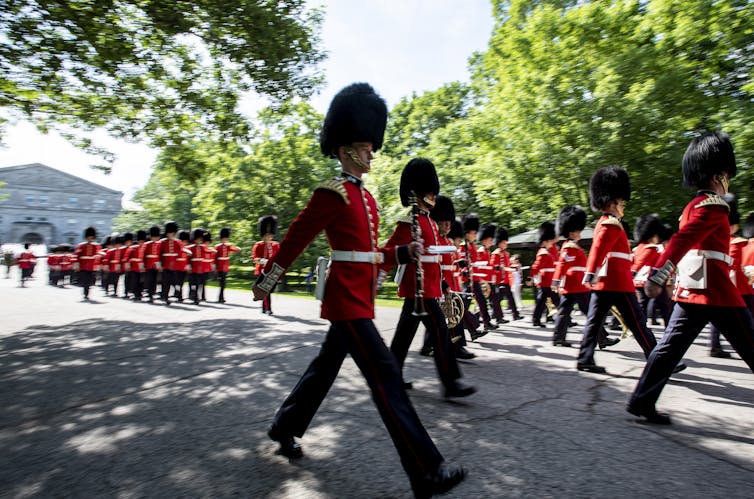
The very position of governor general, inherited from Great Britain when Canada was but a collection of independent colonies, is one of the features that differentiates Canada from other large countries settled by European powers in the Americas.
American influence
Although Canadians rejected the allure of republicanism, politicians over the centuries have felt free to borrow from their American counterparts. Canada pirated federalism (strong regional governments, namely provinces) and a reliance on a written constitution, with the Canadian Charter of Rights and Freedoms’ emphasis on individual rights.
At the same time, the U.S. has been useful as a model of what to avoid: a presidential system of government, slavery, an aversion to gun control and too great a reliance on the free market.
Québec culture
The defeat of France by Britain that resulted in Québec becoming an English colony is a defining event in Canadian history. However, the decision by the victors to guarantee the French their traditional rights and customs, and the political means to protect their culture, was just as important to Canada’s future.
This approach resulted in bilingualism and biculturalism, ultimately becoming multiculturalism, and it distinguishes Canada from many other nations.
But Québec has had historical grievances against the rest of Canada, leading to the 1995 sovereignty referendum that came within a few thousand votes of tearing Canada apart.
Québec separatism, even when in decline as it appears to be now, is an existential threat that surely features prominently in the darkest nightmares of every prime minister — and the governor general.

Indigenous population
Life for Indigenous people in what is now called North America has drastically changed since settlers appeared and did everything in their power to wipe them out, including with longstanding colonial policies like residential schools, the ‘60s Scoop and numerous cases of land dispossession in the 19th and 20th centuries.
Starting in the 1970s, court decisions, changes in federal government policy and determined efforts by First Nations, Métis and Inuit communities and individuals have slowly enlarged the political influence of Indigenous Peoples.
Defining events included Indigenous activist Elijah Harper’s opposition to the Meech Lake Accord in Manitoba, and the Oka crisis, a 78-day standoff over the proposed expansion of a golf course and development of townhouses on a Mohawk burial ground in Québec.

More recently, federal government policy has shifted toward reconciliation with Indigenous people, exemplified by the Truth and Reconciliation Commission and the national inquiry into Missing and Murdered Indigenous Women and Girls.
Although most policy is largely symbolic, such as land acknowledgements, efforts are being made to improve the living conditions in many First Nations communities. The federal government, while missing the March 2021 goal of ending drinking water advisories that last more than a year, has made a dent in providing some communities with safe drinking water.
Read more: Water crisis in First Nations communities runs deeper than long-term drinking water advisories
Yet Indigenous people make up only a small strand in national politics, culture and power structures. Only in Nunavut, with a population of 40,000, do Inuit comprise a majority that allows them to enact laws to protect, sustain and advance their culture and interests.
The new governor general will have to fuse the British, French, American and Indigenous elements of Canada that together are at the core of the country. It is not an easy job, especially given the position is mostly ceremonial and one that not all Canadians see as even necessary.
Thomas Klassen, Professor, School of Public Policy and Administration, York University, Canada
This article is republished from The Conversation under a Creative Commons license. Read the original article.
Closing some of the U.S.-Canada land border crossings could help control the COVID-19 pandemic
Sunday, 21 March 2021 13:28 Written by theconversation 
Kelley Lee, Simon Fraser University; Anne-Marie Nicol, Simon Fraser University; Julianne Piper, Simon Fraser University, and Valorie A. Crooks, Simon Fraser University
During the COVID-19 pandemic, attention to travel measures has largely focused on air travel. This includes the potential use of “vaccine passports” to open up international borders again. However, for countries with extensive land borders, there are special challenges.
Canada and the United States share the world’s longest undefended land border. While the U.S. is Canada’s most important trading partner, it is also the world’s epicentre for coronavirus infections and deaths.
COVID-19 variants of concern are now present in almost all U.S. states. The spread of these variants in the U.S. points to the need for Canada to review the adequacy of public health risk management at land crossings.
Current land border policy
Since March 21, 2020, non-essential travel has been restricted at Canada-U.S. land crossings. Outbound travel for Canadian nationals and permanent residents, and inbound and outbound travel for non-nationals (except Alaska-bound U.S. citizens) are not permitted.
On Jan. 29, 2021, the Canadian government announced new measures for non-essential travel in response to variants of concern. Arrivals by air now have testing and hotel quarantine requirements, and those by land have testing requirements but can self-quarantine or isolate.
Given that hundreds of thousands of essential and non-essential travellers continue to enter Canada by land each month, differences in policy for air and land travel have been questioned.
According to Canada’s Public Safety Minister Bill Blair, the main reason for this difference is logistics. With 117 two-way land crossings, comparable measures “simply aren’t possible, given the existing infrastructure that’s available.”
As a team of travel health and pandemic experts, we suggest that there are solutions to this seemingly insurmountable challenge.
Less land border crossings
There are insufficient resources to provide screening, testing and quarantine measures at all land crossings comparable to air arrivals. Based on our study of travel-related measures during COVID-19, one option is to substantially reduce the number of crossings kept open. This is similar to the funnelling of air arrivals through four airports, and has been a successful strategy in other countries.
After closing some land crossings, the government can then designate selected crossings for incoming non-essential travel only. This prevents bottlenecks hindering essential travel. Given around seven per cent of land crossings during the pandemic are deemed non-essential, and that the volume of land travel has declined by around 90 per cent during the pandemic, temporarily closing some border crossings is also practical.
Crossings remaining open for non-essential travellers should be those that had higher vehicle volumes pre-pandemic such as the Peace Arch, B.C., and Rainbow Bridge, Ont. High traffic crossings already have the necessary inbound and outbound road networks to allow ease of access. They generally also have hotels nearby. This can enable an extension of mandatory quarantine at designated sites for travellers entering by land. These crossings should also be within a reasonable driving distance of a hospital should there be a need for health care. The border crossings themselves would need to have sufficient staff to accommodate any enhancements made to testing protocols.
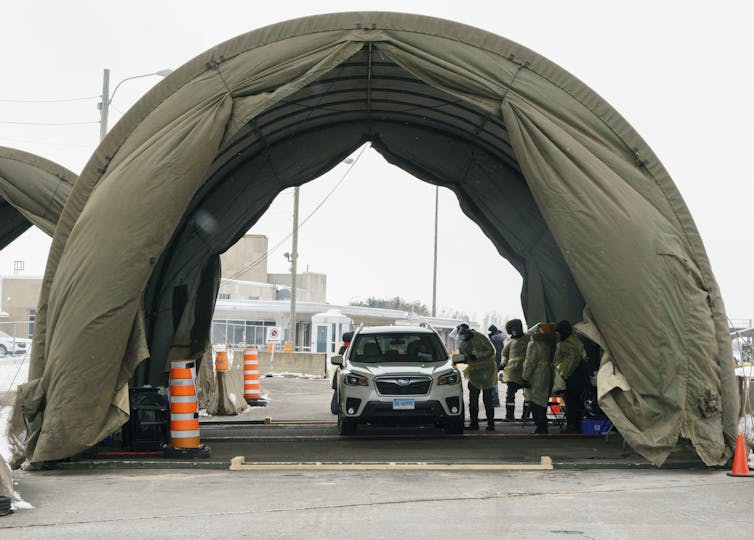
Tailoring approaches
By streamlining land border crossings, on-site public health resources available can be tailored to specific types of travellers. For non-essential travel, alongside enhanced screening, testing and quarantine, arrivals should be provided with tailored information.
For example, in the coming weeks thousands of “snowbirds” are expected to return to Canada by land. These long-stay travellers should be directed to reliable sources of information regarding vaccine roll-out in their province as many will fall within priority groups. Those who were inoculated abroad should be given details on how to register this information in their personal vaccination record.
Read more: Why some snowbirds are flying south despite the COVID-19 pandemic and travel restrictions
Transport workers comprise a large proportion of essential travellers crossing by land. The World Economic Forum ranks transport workers as being at highest risk among approximately 950 non-health occupations during COVID-19. Many Canadian truckers have been concerned about potential exposure to the coronavirus in the U.S. and risk of infecting family members upon their return.
We agree with calls for transport workers to be vaccinated as a priority group. In the meantime, rapid testing should be provided at land crossings designated to serve essential travellers.
All entry points
A more coherent Canadian strategy on border management requires consistency in the measures applied for air, land and sea arrivals. At a time when COVID-19 and its worrisome variants are being brought into Canada via travel, reducing points of entry has several benefits.
Limiting the number of crossings enables us to concentrate resources and enhance public health risk management. This would also facilitate any plans to introduce more testing or even vaccine passports for essential travel. And the incentive for travellers to circumvent air travel measures by diverting to land crossings would be reduced.![]()
Kelley Lee, Professor of Global Health Policy, Canada Research Chair in Global Health Governance, Simon Fraser University; Anne-Marie Nicol, Associate Professor, Health Sciences, Simon Fraser University; Julianne Piper, Research Fellow, Health Sciences, Simon Fraser University, and Valorie A. Crooks, Professor, Department of Geography and Canada Research Chair in Health Service Geographies, Simon Fraser University
This article is republished from The Conversation under a Creative Commons license. Read the original article.






